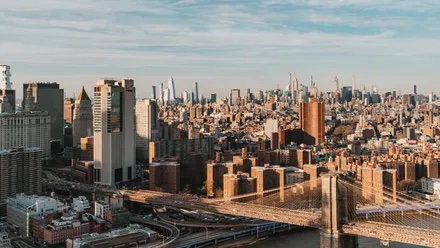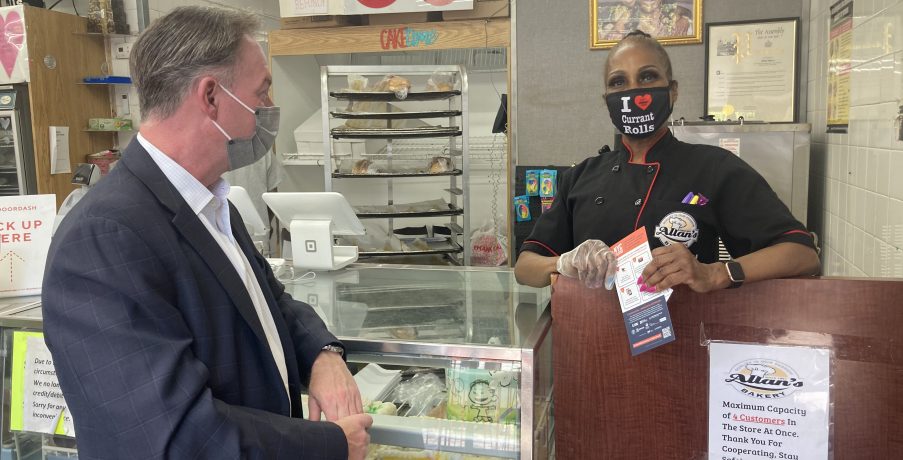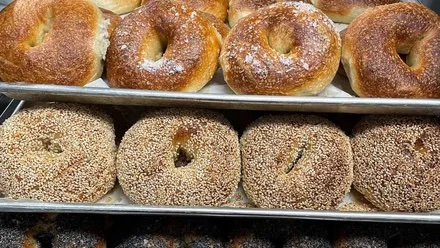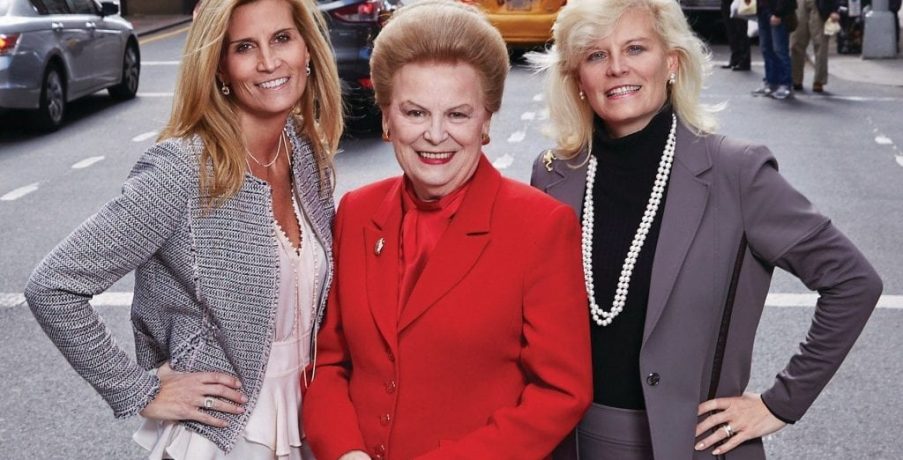
-
What to do about the vacant offices that are slowing NYC’s economic recovery
Post Views: 624By Joe Connolly and Neil A. Carousso
NEW YORK (WCBS 880) — Traffic volume into Manhattan soared after Labor Day as many companies began requiring employees to be in the office at least three days a week and Wall Street firms, including JP Morgan and Goldman Sachs, nixed remote work altogether. Still, many office buildings remain mostly empty.
Office occupancy in New York City was just 38 percent last week, according to Kastle Systems, which tracks building swipes. That’s a 3.5 percent increase from the last week of August when many white collar workers ditch their business suits for bathing suits down the Shore or out East in the Hamptons.
“This could be a 10 to 20 year painful process where we have vacant buildings that were once assets to our communities, now, will be liabilities unless we put policies in place that streamline the approval process to convert these buildings and provide economic incentives to help facilitate that,” said Scott Rechler, chairman and chief executive officer of RXR, on the WCBS Small Business Spotlight, sponsored by Dime Community Bank.
Rechler, who sits on the boards of the New York Federal Reserve and the MTA, points to New York’s recovery from 9/11 when rezoning enabled many office buildings in Lower Manhattan to be converted to apartments.
“If we can do that, we could take that, you know, 10 to 20 year period and bring it down to a five to 10 year period.”
The real estate developer said those conversions will allow buildings to be competitive in a post-pandemic environment.
“Buildings that can provide the highest level of experience and engagement and what we call ‘third spaces’ where people can collaborate and bond and become parts of broader communities will actually thrive. But, buildings that are more commodity-like – class B buildings, class C buildings that aren’t close to public transit – frankly are going to become obsolete,” said Rechler.
RXR is looking at converting some of their Manhattan office buildings into mixed-use buildings where New Yorkers can work and live, which Rechler calls part of the “post-pandemic playbook” to attract more workers to the city.
“If you look at our multi-family portfolio – and we have 10,000 units of multi-family – we’re 99 percent occupied,” he said. “I’m optimistic because the people is (sic) the fuel that drives the long-term vitality of this economy and they’ve come back.”
He told WCBS 880 the next step is for real estate developers, like himself, to create affordable housing to attract more talent to the five boroughs. A lack of housing inventory has led to an increase in home prices and rents. Rents in RXR buildings, Rechler said, are 10-20 percent higher than they were before the pandemic.
New office buildings now include amenities such as health and wellness spaces to incentivize employees to work in-person.
The firm is also noticing companies headquartered in Manhattan are opening satellite offices in their buildings on Long Island and New Jersey.
“Companies want to have spots that are closer to where people live both for affordability and convenience,” Rechler said. “So you see a number of banks, for example, have opened up offices in New Jersey or some of the pharmaceutical companies and the same thing we’re seeing in Nassau County.”
“That will enable people to live closer to home and have a shorter commute for part of the week or the whole week, depending where they are, but still be able to convene in New York City with all their peers where you can focus on culture building, ideation, collaboration, that you can’t get if everyone’s working independently.”
Rechler sees the city is transitioning from a Manhattan-centric economy to what he calls a “superstar region,” which he believes will be more sustainable post-pandemic.
See more on the future of the office on the Small Business Spotlight video above.
-
Kickstarter Pilots 4-Day Workweek, Keeps Employees Remote
Post Views: 597By Joe Connolly and Neil A. Carousso
NEW YORK (WCBS 880) — Kickstarter is experimenting with a four-day, 32-hour workweek, which has gained momentum in parts of Europe as the pandemic shined a light on the need for work-life balance.
The six-month pilot program began in April. Early results are promising, according to the Brooklyn-based crowdsourcing company. It has seen improved efficiencies company-wide.
“The four-day workweek for us has been an exercise that’s allowed us to really improve all of those sort of dynamics in our business so that employees are more engaged,” said Kickstarter chief strategy officer Jon Leland on the WCBS Small Business Spotlight, sponsored by Dime Community Bank.
“When they come to work, they are rested and more focused, they’re all more motivated to get their work done faster,” he said.
Leland said Kickstarter’s operations have already improved after cutting some of the major time sucks.
“Meetings are the number one killer of time,” he said. “There’s a lot of aspects of sort of documentation or just dumb processes that have gotten built up over time that people just continue to do that they know doesn’t really matter and isn’t useful.”
The CSO told WCBS 880 the company has “empowered” middle managers to eliminate redundancies and streamline workflow.
The four-day workweek comes without any reduction in salaries or benefits. The company has also decided to keep its employees remote because of productivity and to save on rent.
“From a real estate perspective, because we had to look at this as well, it’s just very expensive to own or lease and run an office setting if you’re not using it five days a week,” said Leland. “It just didn’t make financial sense.”
Kickstarter will measure the program’s success by revenue and money raised for startups on the platform.
It has recently seen a bump in new investments in e-commerce and gaming businesses.
“Tabletop games has (sic) become just a massive part of the Kickstarter ecosystem because I think people want to spend time with each other, also doing things in real life together, and tabletop board games are a great way of doing that. So, we’ve seen that emerge as just a really massive part of our business.”
Leland said the biggest backing Kickstarter ever hosted on its platform was earlier this year when author Brandon Sanderson raised $41.7 million to publish books he wrote during the pandemic.
See more on the WCBS Small Business Spotlight video above.
-
‘Live, Work, Play’: Why Businesses are Choosing Brooklyn over Manhattan in Pandemic Recovery
Post Views: 568By Joe Connolly and Neil A. Carousso
NEW YORK (WCBS 880) — Brooklyn has become the fastest growing borough in New York City’s pandemic recovery.
“People just love the live, work and play vibe that we’ve got going here,” said Randy Peers, the president and chief executive officer of the Brooklyn Chamber of Commerce, on the WCBS Small Business Spotlight, sponsored by Dime Community Bank.
Peers noted that in order to understand the COVID-19 recovery, one would have to look at what he calls the “rebranding” of Brooklyn that began in the 1970s when crime gave the borough a dark reputation.
“We were the fourth largest manufacturing center in the country after World War II,” he said. “Then, like most industrial cities, we went in decline. Heavy manufacturing left, people left, they left to the suburbs.”
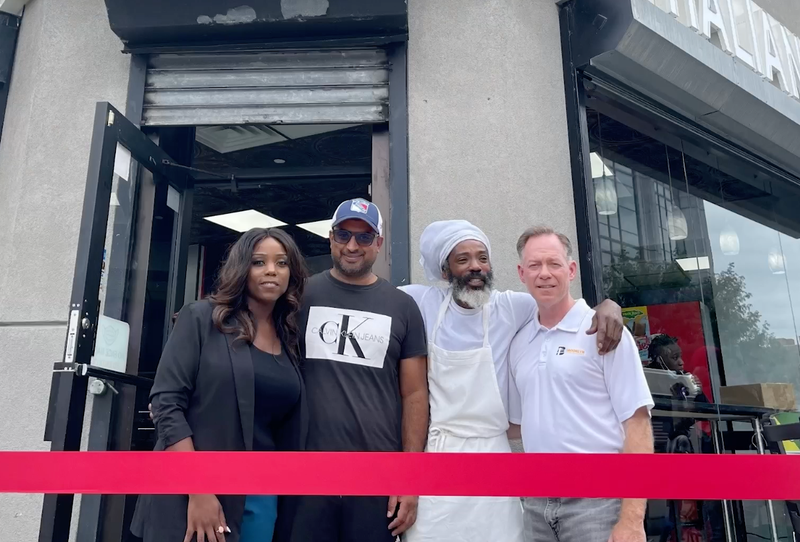
Photo credit Brooklyn Chamber of Commerce The key to Brooklyn’s transformation into a creative hub, Peers told WCBS 880, was the conversion of old industrial space into residential buildings.
“I like to say this a lot, but mixed-use matters and it gives that sense of a true sort of holistic community. And I think that’s part of the rebranding story.”
A recent Partnership for New York City survey found only 8% of office workers have returned full-time. Remote and hybrid work have accelerated business growth in Brooklyn.
“I mean, if you’re working from home, you’re more likely to shop locally,” said Peers.
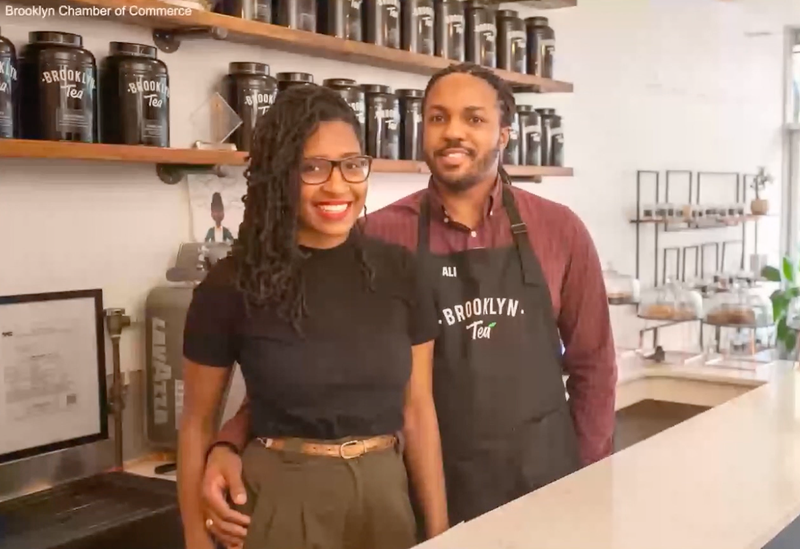
Photo credit Brooklyn Chamber of Commerce The Brooklyn Chamber of Commerce said technology is the borough’s fastest growing industry with the highest paying jobs.
“People don’t realize this, but we rival San Francisco in terms of new tech startups. But it’s what I call little tech. It’s not big tech.”
“We’ve got Newlab out at the Brooklyn Navy Yard, we’ve got NYU Tandon Future Labs. We’ve actually tried to cultivate tech through these wonderful incubators,” said the Brooklyn Chamber of Commerce leader.
Another incubator that has helped launch numerous startups during the pandemic is the Brooklyn Public Library in Prospect Park. Their business experts guided Brooklyn Tea, new environmentally conscious companies, e-commerce brands and more with skills and managerial training. Its PowerUP! program awarded a total of $41,000 in seed capital to eight finalists last year.
While business is booming in Brooklyn, Peers emphasized on the Small Business Spotlight that the outer boroughs need Manhattan to thrive because it’s the city’s economic engine.
“I will say we need Manhattan to bounce back. We need office workers to come back if we’re going to have a full recovery for New York City as a whole.”
Peers said there are three factors still holding back the city’s recovery: back rents from the COVID-19 shutdown need to be resolved; labor shortages in key sectors such as childcare are keeping some people out of the workforce; and people are cutting back on their spending due to high inflation.
See more on New York City’s recovery, the post-pandemic economy taking shape, and the neighborhoods in Brooklyn where businesses are booming on the WCBS Small Business Spotlight video above.
-
Schmear Gold! CT’s Popupbagels Makes Waves in NYC
Post Views: 851By Joe Connolly and Neil A. Carousso
NEW YORK (WCBS 880) — As the saying goes, “If you can make it here, you can make it anywhere.” But, whoever heard of a bagel company from Connecticut making it in New York City?
Introducing: Popupbagels.
“People started asking like, ‘Hey, I’m going back to New York. Can I grab an extra dozen so I can bring it to my family?’ And I would say, ‘Well, wait a second, like you live in New York, there’s bagels there.’ And they were like, ‘No, but yours are better. You need to come to New York,'” recalled founder Adam Goldberg on the WCBS Small Business Spotlight, sponsored by Dime Community Bank.
Goldberg started the business in December 2020 in his Westport home. Within several months, he sold tens of thousands of dollars worth of bagels and moved into a commercial kitchen in Connecticut and partnered with New York restaurants, including Danny Meyer’s Daily Provisions, where he makes bagels by order for pickup only.
“We borrowed some kitchens in New York and started cooking there. And, you know, it kind of took off,” he said.
Popupbagels does not have a storefront, but they have pickup locations in Westport, Redding, Greenwich, Manhattan and the Hamptons.
“It’s like a bagel shop that’s so exclusive, you can’t get into it,” Goldberg said.

Popupbagels does not have a storefront, but they have pickup locations across the New York City area. Photo credit Popupbagels He told WCBS 880 that its rapid growth has solely been a result of organic marketing.
“Our whole marketing budget is spent on Instagram, which is amazing, because it’s essentially free. And then it’s really just word-of-mouth.”
Goldberg said he surveyed his customers to find out why they believed Popupbagels stood above its competition and discovered it is because his bagels are more like traditional New York bagels from the 1980s than what you will find in a Manhattan deli today.
“The average bagel in New York right now is over 150 grams where our bagels (are) about 105 to 110 grams. So, you don’t eat it and then feel like you need to take a nap; you kind of eat it, and you basically feel like you want a second one,” he said.
Popupbagels serves different flavor cream cheeses from local restaurants and runs various promotions to bring in more customers. It also has a subscription service.
“I grew up in Livingston, New Jersey, and we always, every weekend, went to Livingston Bagel (and) bought a dozen bagels,” said Goldberg “(We) would come home, throw them on the middle of the table, and as a family, we would eat bagels.”
That family tradition inspired his subscription model, where for $38, you can get a dozen bagels every week. Popupbagels now has 450 subscribers across Connecticut.
See how Popupbagels has grown from Goldberg’s home kitchen in Fairfield County to New York City on the WCBS Small Business Spotlight video above.
-
Travel Consultants in Demand as Business Travelers Return to Skies
Post Views: 690By Joe Connolly and Neil A. Carousso
NEW YORK (WCBS 880) — As business travel begins to pick up, agencies are discovering new post-pandemic expectations.
“This ‘bleisure’ theme is definitely coming back,” said Jennifer Wilson-Buttigieg, co-president of Valerie Wilson Travel, on the WCBS Small Business Spotlight, sponsored by Dime Community Bank.
“Bleisure” is a portmanteau of “business” and “leisure,” which grew in popularity as people enjoyed working remotely from scenic getaways and vacation hotspots.
“We’ve seen companies want to have culture and community and focus on their core values. And they’re doing it with offsite meetings. They’re doing it with retreats.”
Valerie Wilson Travel noticed the owners of small and medium-sized businesses were among the first to fly again.
“(Small business owners) were the first ones to get back on the road, because they wanted to see their customer. They wanted to look them in the eye, shake their hand, thank them for their business,” said Wilson-Buttigieg.
The Manhattan-based firm employs a team of industry specialists working day and night to cater to corporate clients.
“We have employees that work on different accounts or different businesses like leisure, corporate, cruises, safaris,” she said. “And then we have independent contractors who run their own business under our umbrella. And as an independent contractor, they certainly could work 24/7, but we do also utilize a 24/7 service.”
VWT’s corporate and individual clients turn to its advisors for more personalized service, which is at the roots of the business.
“Knowing that time is the most precious commodity, whether you travel for business or vacation, you want it to be the experience you’re planning,” Wilson-Buttigieg said. “And no differently than having a professional help you on a will or sell a home or do your taxes, the role of the advisor has been elevated.”
Her mother Valerie Wilson started the company in 1981 after she could not find a travel consultant who would give her trip across Europe the individual attention she desired. Wilson returned home and launched Valerie Wilson Travel.

Photo credit Valerie Wilson Travel “We’re in the business of serving and we love the travel industry,” said Wilson-Buttigieg.
Valerie Wilson Travel was acquired by another family-owned business, Frosch International Travel, in April 2021 because the Wilson family did not want to lay off any employees during the height of COVID when its business was down as much as 95%.
“We were so excited to bring these two powerhouse brands together, but with the goal of saving as many employees, jobs and benefits during this very challenging period, because we knew travel would eventually rebound and we’re going to need them,” the second-generation president said.
Research suggests 60% of family-owned businesses fail to transition to the second-generation, while third-generation businesses fail nearly 90% of the time. For VWT, the bond between sister co-presidents – Wilson-Buttigieg and Kimberly Wilson Wetty – leading the second-generation appears strong.
“We try to text each other as sisters and we email each other as colleagues,” said Wilson-Buttigieg.
See more on this thriving family-owned business and the changes in travel on the WCBS Small Business Spotlight video above.
News Stories
Social Feeds

VIDEO: Told the airline to book us on the next flight out (SPONTANEOUS TRIP!)

VIDEO: The Taylor Swift Effect | WCBS Business Breakfast

VIDEO: Future of NYC | WCBS Business Breakfast

VIDEO: Reasons for New Yorkers to be Optimistic | WCBS Business Breakfast

VIDEO: NYC's AI Chatbot | WCBS Business Breakfast


